|
Getting your Trinity Audio player ready...
|
Rina Teran draws a drastically important difference between the concepts of mentorship and sponsorship. The words are used interchangeably at present, but the current US chief counsel, chief securities counsel, and assistant corporate secretary at Constellium believes that for more women and Latinas to find their way into senior positions, that difference needs to be understood and acted upon.
“A mentor is that person who guides you, who helps you grow, and cultivates your development which is incredibly helpful,” Teran says. “Sponsorship is where I see the most critical need today for women, especially for Latinas. For me, a sponsor is someone in a position of power that can actually open doors for you and help push you through those doors. Sponsors are so much more rare, and I really believe we need more people stepping up into that role.”
You don’t need to look around much to understand why Teran is so adamant about the importance of sponsorship in the corporate arena. When it comes to women in in-house legal roles, even in Teran’s adopted and mostly lifelong home of New York City, gender equity is brutally low. When it comes to diverse women, it’s much worse.
“For me, a sponsor is someone in a position of power that can actually open doors for you and help push you through those doors.”
Rina Teran
Thankfully there are women like Teran, an attorney with twenty-plus years of experience and a self-identified “securities nerd,” who has worked her way up throughout her career to a position where she is able to be that sponsor whenever she has the opportunity. And she’s willing to have those hard conversations to push for change.
Case in point: Teran is tasked with cultivating outside counsel relationships for Constellium in North America. As just one example, during the COVID-19 pandemic, she requested that a firm source a female attorney to lead certain matters, preferably one with a diverse background. When Teran met the attorney, the outside counsel was honest about the fact that no one had made that request before in her career and unless Teran had specifically requested her, she wouldn’t have had the opportunity to work with Teran—despite being overly qualified for the role. Teran says she is grateful to firms that are embracing diversity and gender equity and making strident efforts to achieve more equality in law.
“I didn’t look for sponsors while I was coming up,” Teran explains. “Frankly, there weren’t many even if I had been. I’ve worked incredibly hard to get where I am, and I want to be that sponsor for anyone that I can. And I am willing to use that voice to propel this much needed change.”

Teran’s voice may have come later in life, at least in the United States. She was a young child in Ecuador when her parents moved to the US, and she and her elder sister stayed behind to live with their grandmother. Teran was just two-and-a-half, and so anytime she saw a plane in the sky, she believed it was her parents returning home. She would become so excited, running from window to window to see the plane, that she once fell down the stairs onto a cement floor and violently slammed her head. It wasn’t just a routine bump—in fact, a doctor wasn’t sure that Teran would make it through the night.
“That experience brought me so close to my sister, who is ten years older than me,” Teran remembers. “She called me her little miracle, as she wasn’t sure that I would live. She became like a second mom to me, and is one of the many reasons I am deeply committed to my family.”
When Teran was almost six, she and her sister came to America and moved to the South Bronx in New York City with their parents. Teran had to learn English and spent years as the “quiet one” in the classroom absorbing as much as she could around her. But soon, her test scores would demonstrate that the quiet child wasn’t behind in the slightest, but in fact, was capable of doing great things.
Teran stated that education changed her life and credits her teachers with believing in her, helping her apply for scholarships, and opening doors for her early on that her family would not be able to do on its own. The commitment to studies and hard work was a given, but it was mentorship and sponsorship that would ultimately propel her to Columbia University and beyond.
There were constant struggles in the interim, but Teran says those prepared her to be the sponsor she can now be for those women around her who are working to rise. They see an executive leader and a recognized expert in overall legal issues and international securities work, well-suited for a general counsel role, given her constant drive to evolve and continuously learn as well as her extensive experience throughout her career advising senior and executive management and corporate boards.
“In my career, I’ve had incredible women support me, and it’s now my turn to help open those doors for others. The fight is far from over in this quest and we need all the support we can get.”
Rina Teran
In Teran, women see someone willing to speak with them about their goals, desires, and efforts to pry open those doors by any means necessary—politely of course, Teran says with a laugh. Teran’s sponsorees may be in any function—including HR, legal, insurance, or finance—internal or external. She doesn’t care; she just wants to help.
The chief counsel says that now, more than ever, she hopes women will continue to support each other as they work to rise in their own careers. That shared bond of an understood struggle should unite, not divide them. “In my career, I’ve had incredible women support me, and it’s now my turn to help open those doors for others,” Teran says. “The fight is far from over in this quest and we need all the support we can get.”

